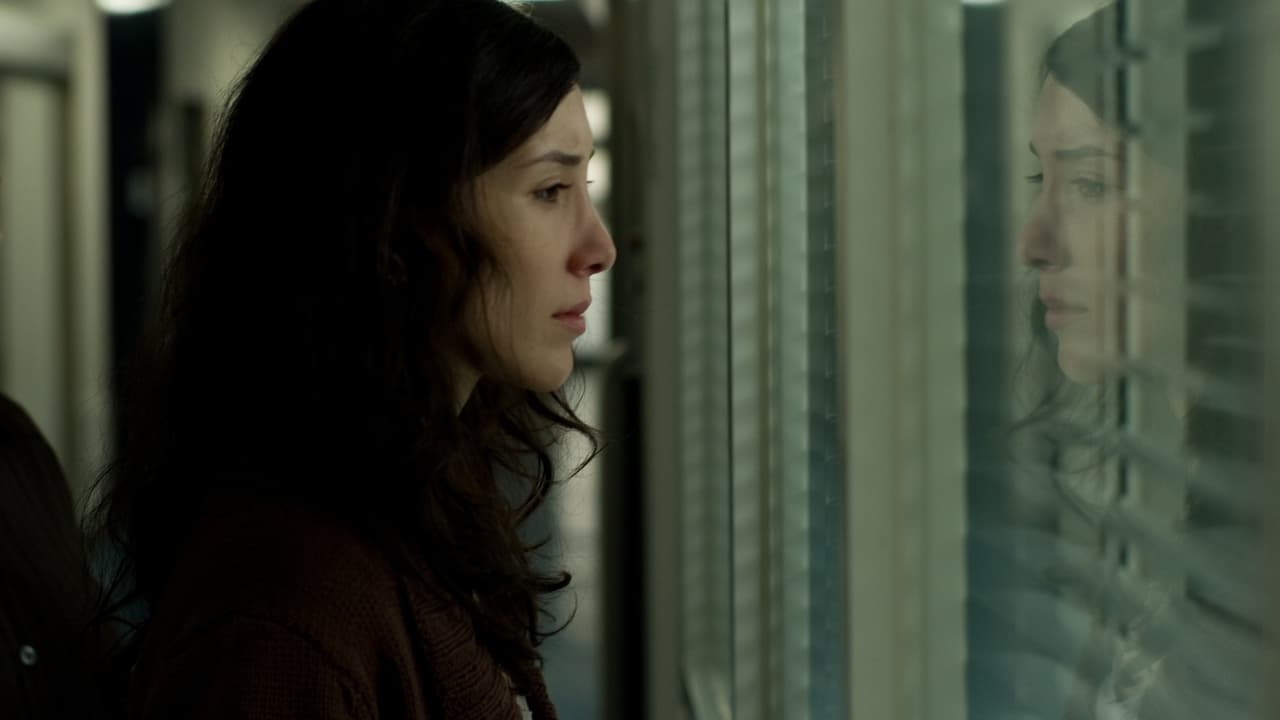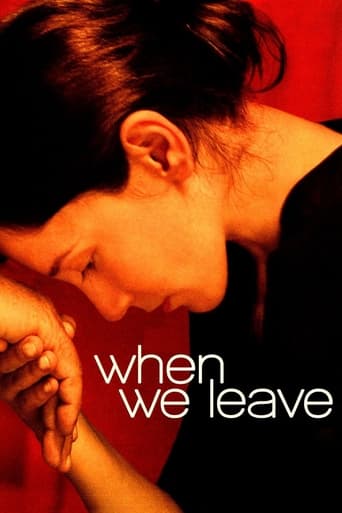

Sorry, this movie sucks
... View Moreif their story seems completely bonkers, almost like a feverish work of fiction, you ain't heard nothing yet.
... View MoreThe first must-see film of the year.
... View MoreA great movie, one of the best of this year. There was a bit of confusion at one point in the plot, but nothing serious.
... View MoreAustrian screenwriter, producer and director Feo Aladag's feature film debut which she wrote and co-produced, premiered in the Panorama section at the 60th Berlin International Film Festival in 2010, was shot on location in Turkey and Germany and is a German production which was produced by Turkish screenwriter, producer and director Züli Aladag. It tells the story about a 25-year-old woman named Umay Aslan who after having had an operation at a hospital in Germany, returns to Istanbul, Turkey where she lives with her adolescent son named Cem, her husband named Kemal and his family. Umay has gotten enough of all the suppression she has endured from Kemal, and the day after her return she packs her bags, takes her son, leaves her miserable marriage and travels to Germany where she thinks she will be welcomed by her parents named Kader and Halyme whom is living there with her brothers named Mehmet and Arcan and her sister named Rana. Distinctly and precisely directed by Austrian filmmaker Feo Aladag, this quietly paced fictional tale which is narrated from multiple viewpoints though mostly from the main character's point of view, draws a reflective and increasingly dramatic portrayal of an adult Turkish-German woman whom after making a decision regarding the best interest and future of her child and herself comes to her parents believing that they will support her viewpoint and learns that their stand on her choice is that she is selfish and that she has disgraced the family name. While notable for it's atmospheric and naturalistic milieu depictions, sterling cinematography by German cinematographer Judith Kaufmann, production design by German production designer Silke Buhr and use of sound, colors and light, this character-driven and narrative-driven story about family relations where the youngest daughter in a family who is about to get married suffers the consequences of her sister's actions, a father and mother and their two sons becomes so ashamed due to their regard of other peoples thoughts and views that they disown their family member and a mother who will no longer jeopardize the well-being of herself and her son for the sake of honouring the expectations of others, depicts two isolating and merging studies of character and contains a great score by German-born British composer Max Richter and Czech composer Stéphane Moucha.This cinematographic, consequential and gently romantic drama from the late 2000s which is set during a summer in Germany in the 21st century and where a father is struggling to forgive his eldest daughter whom has gone against his will and a courageous woman whom is unwanted by her family is heard by a friend and meets a German man named Stipe, is impelled and reinforced by it's cogent narrative structure, substantial character development, rhythmic continuity, pivotal instrumental tones and dialog, scenes of Umay, Umay and Cem and Umay and Stipe and the poignant acting performances by German actress of Turkish descent Sibel Kekilli, Turkish-born German actress Nursel Köse, Turkish actor Settar Tanriögen, Turkish-German actor Tamer Yigit and German actor Florian Lukas. A subtle, sociological and gracefully humane directorial debut which gained, among several other awards, the Label Europa Cinemas Award Feo Aladag at the 60th Berlin Film Festival in 2010.
... View MoreThe writer obviously intended to shock the viewers with the surprise ending, and he did, but it ruined the movie. I could have understood murdering the mother (understood, that is, not approved of), but murdering the child just doesn't fit the story. For one thing, male (not female) children were highly valued. For another, the father said he wanted his son (but not his wife) back, and made a feeble attempt to get him back. During that attempt, his father-in-law chastised him, telling him that a physical tug-of-war in the street was not the way to go about it. So, the father-in-law would then approve of killing the boy? Not likely! Now, some people have said that the boy was killed by accident, but that's incredibly sloppy. It would have been easy to kill the mother without harming the child. And, call it bad acting, but the brother's reaction to killing the child did not look like surprise to me! It would have been a far better ending for the mother to pick up the gun off the street and shoot her brother, who was advancing toward her with a knife.
... View MoreAfter seeing this film, I assumed it was directed by a Turkish director named Feo Aladag. When I googled this name, a picture of a young blond woman filled the screen. As it turned out, Feo Aladag is an Austrian actress/director, married to Turkish/German author Zuli Aladag, who is also the producer of Die Fremde. I mention this because I think it is important. In this film, the Turkish community in Germany is not pictured in a very favourable way. The story shows the fate of Umay, a young Turkish/German woman who wants a divorce because her husband beats her and because, perhaps more importantly, she doesn't love him. She leaves her husband and moves with her young son to her family in Berlin. Surprisingly, her father and brother take sides with her husband and urge her to return to him. In their view, she has dishonoured her husband and her own family by separating her son from his father. This conflict escalates in a dramatic way, with terrible consequences. The film pictures Umay as a woman who is denied her 'Western' rights as a woman and a mother, and shows her family as driven by 'non-Western' values like honour and tradition. For them, the community is superior over the individual. For her, it's the other way round. The message is pessimistic. Umay is a Turkish woman who adopts the German lifestyle. She wants to live her own life. She follows the integration model that the Turkish people in Western Europe are supposed to follow. But her brother and sister don't support her, although they are born and raised in Germany. They speak the German language, but think the Turkish way. Like some of the films of Faith Akin (in which lead actress Sibel Kekilli also starred) this film focuses on the problems of the Turkish community in Germany. But it has a darker and more pessimistic tone. It's a very powerful movie, dealing with a very urgent issue.
... View MoreAustrian actress Feo Aladag's directorial debut touches upon the concept of "namus" which has been treated many times before. Namus,which is roughly translated as "honor" is a female-bound ethical category in patriarchal societies. It is ostensibly a part of the traditionalist Muslim societies but the concept "namus" actually predates Islam and the Judeo-Christian religion. Regarded as the perfect form of female appropriateness today,namus in time lost its connection with religion and became an expression of hidebound traditionality.What makes this concept a popular subject for the cinema makers is the fact that the very concept does not set any rules for men in uber-conservative societies.In such a society males are supposed to control the women in their families. The fact that men are unaccountable for their actions while women should act perfectly along the line of appropriateness shows that "namus" came to be social mores that has not much to do with religion. In the movie Sibelli Kekilli plays a battered housewife who has been continuously abused by her husband. When she can't take it anymore she decides to go back to her family in Germany. Her family gives her a chilly welcome when they realize she is planning to leave her husband. Presumably from a generation of Gastarbeiter, the family is utterly conservative and a daughter's coming back to family with her kid and ending her marriage is unthinkable for them no matter how violent her husband would be. No matter how many times it has been treated before, the subject is a humanitarian one.It is not difficult to denounce the tartuffery of pious morality but you need to get credits for that. Die Fremde does not exactly offer a thought-provoking portrait of a damsel in distress.It feels like shouting at your face and telling you "I have thought of everything for you." Umay pursues an effectively independent way for herself and her son. She leaves her husband, she even leaves her family when she realizes that they will take her son from her. What does she do then? In spite of the warnings of foster home authorities, she continues to see her family. Though she gets physically attacked by her brother, she goes to her sister's wedding. Is that the way a girl who wants be independent should act? Why should a girl who has found a -sweet,caring boyfriend who wants be a father for her kid- be a pathetic person? Feo Aladag criticizes the stubbornly prejudiced, narrow-minded and inflexible mores of this society but she just indulges in incoherences. When Umay's mother Halime (Derya Alabora) hears that her other daughter Rana (Almila Bagriacik) is pregnant from her boyfriend all she says is "We're ruined." and the father just sighs when her wife says "they must get married". In a family like the one in the movie, Rana is supposed to be killed because of having blemished family's honor. What does the father do? The father chooses to pay the boy's father to get a definite marriage.Instead the family decides to kill the other daughter who can legally get a divorce.Let alone the fact the the characters do not act like a Turk (when the conversation turns into Turkish the characters do not sound as natural as they sound in Turkish.No Turkish-Muslim watches his son's imitative praying instead of following the imam during the salat in the mosque)they do not really give the reactions you expect from a traditionalist family. Sibel Kekilli's acting is superb but the story remains unconvincing,slipping too easily into melodrama and a series of incoherent scenes.
... View More